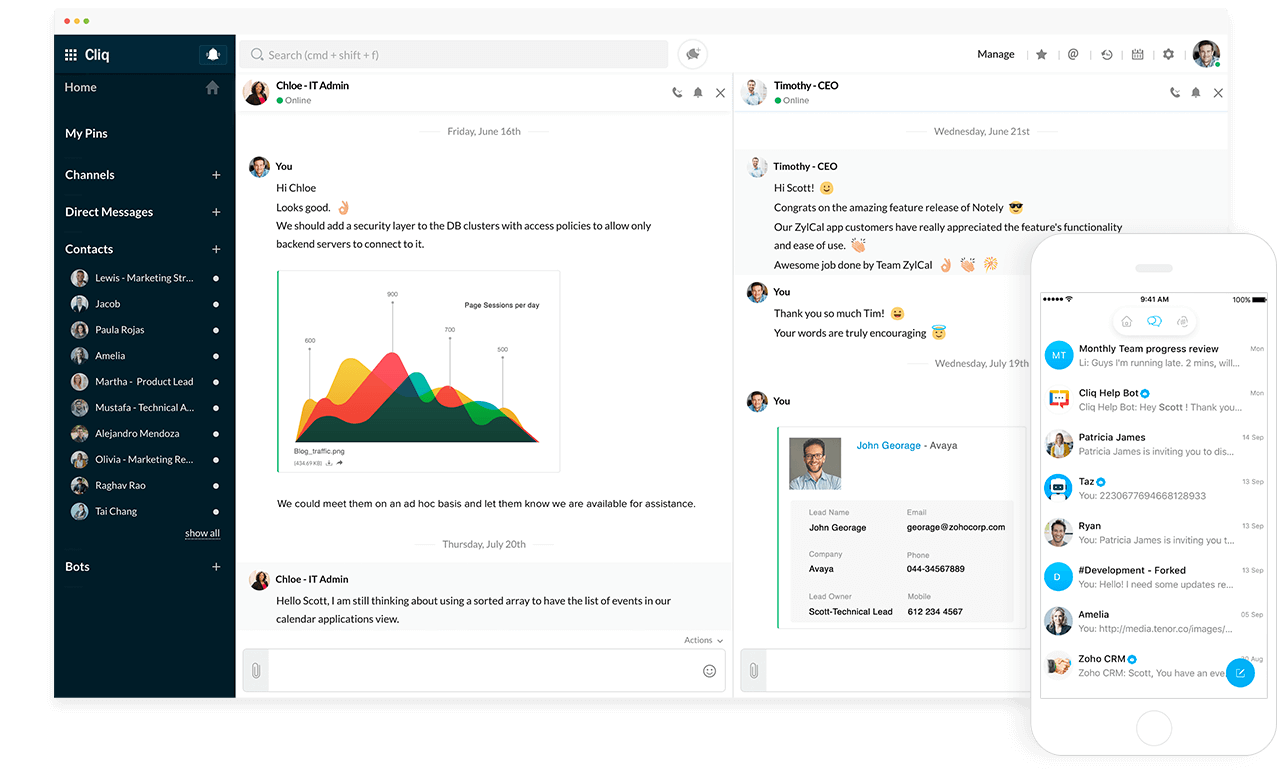You probably landed on this page because you found out that Atlassian partnered with Slack and is going to retire Hipchat and Stride.
They are encouraging you to use Slack, but Slack is not the tool you want, not least because you were paying $2/user/month for Hipchat, and Slack costs a whopping $8/user/month.
We’ve compiled a list of Hipchat and Stride alternatives for team communication to help with your research. Just for the record, while there are many Hipchat alternatives, we picked tools with a good market presence and developed by recognized vendors.
uShare.to

uShare.to is the tool we use at HyperOffice for team communications. Salient features of uShare.to include:
- Video and audio conferencing (available in the free plan)
- External conferencing: you can host video conferences with users that haven’t signed up to Ushare.to
- Screen sharing. Unlike other tools, multiple users can simultaneously share their screens.
- Group chat instant messaging with threaded conversations
- Integration with Google Apps, Dropbox, OneDrive, and more.
- The ability to share documents, calendars, notes, and contacts
- Task management
- E signatures to manage deals and contracts.
Additionally, uShare.to includes features for sales and service teams to work with prospects, customers, and partners. Some of the features to achieve this are:
- Website chat widget
- Video calling with website visitors without prior installations or signups.
- Visitors browsing history
- Rich sharing: share files with customers and prospects
- Tagging and ticket management
- Reporting
The uShare.to free tier offers your video conferencing and unlimited chat history.
Webex Teams, by Cisco
Amongst its other interests, Cisco is betting high on the collaboration software market. For its product, Webex Teams, it differentiates itself by leveraging its core strength - video conferences and video meetings—while offering other collaboration features:
- Video and audio conferencing
- Whiteboards
- Call regular phone numbers
- Group chat and IM
- File sharing and meeting scheduling.
Microsoft Teams
Microsoft recently announced to release a free tier to expand its reach beyond its more than 200 k organizations —many of them Sharepoint and 365 users. Slack replied with a full-page ad in the New York Times.
Microsoft Teams brings features expected from team communication solutions - video/audio conferencing, group chat, instant messaging, but what really sets it apart is its ability to integrate with Microsoft’s other products:
- It integrates with OneDrive, Sharepoint, and other Microsoft products. I would love to use the adjective “smoothly” but the Microsoft UX sucks (my opinion) and can easily take more than 30 minutes to sign up. I had to post this somewhere. No regrets.
- Unlimited chat text and files history, unlike Slack which only allows you to browse the last 10,000 messages.
- Guests access available
Google Meet

Most of us are already familiar with using Google Hangouts in our personal lives. Google Meet is its business counterpart of the same product. The centerpiece in Google Meets is its video conferencing capabilities, while in other products listed above, the products are structured around persistent workspaces, which assume that people want to do a lot more than just have video conferences. Moreover, Google Meet does not come as a stand-alone product but is included its GSuite product, which also includes email, calendars, document storage etc. If you are looking for an expansive product, this might be a good choice.
Zoho Cliq

Zoho is a big player, mainly recognized for its incredible free plans, and Zoho Cliq is not an exception: they offer unlimited chat history hosting and video conferences in the free tier. Other features you may find useful are:
- Events: you’re allowed to create and schedule meetings with other users and set reminders.
- Project management through bots: get notifications of daily due tasks through notifications.
- Zoho Marketplace: Zoho offers dozens of extensions to power up your apps
Facebook Workplace
There is a new adage that I just made up that says “you’re not a tech giant if you don’t offer your own collaboration software”. It’s well borne out by reality if you look around - Cisco - yes, Microsoft - yes, Google - yes.
What about Amazon?… Oh dang, they do, too.
But Apple would never… Yup, they offer one.
We can’t expect Facebook to get left behind do we? Introducing Facebook Workplace.
Facebook was already built with a collaboration mindset: groups, private chats, group chats, announcements, tagging, and it was very smart to migrate these capabilities to the corporate world.
Facebook includes the things you would expect from a team communication product, video conferencing, group chat, file sharing etc., but what really sets it apart is the business counterpart of many features we are used to in our consumer lives - groups, activity walls, personal activity streams, profiles etc.
If your organization likes to collaborate the social media way, this might be the product for you.
Further readings:
